#55: Dialogue as a Weapon (Manipulative Dialogue)
Many characters use dialogue as a speech act—as an action that can create or induce change. And one of the primary modes of dialogue is persuasion: the act of speaking can often influence emotions and choices.
While many characters will go to great lengths to be persuasive—consider, for example, Mr. Collins’ proposal to Elizabeth in Pride and Prejudice—other characters use dialogue not simply as a means of persuasion, but as a weapon. These characters wield dialogue in manipulative and even abusive ways.
In Mansfield Park, Mrs. Norris consistently uses dialogue as a weapon. She does not do so to everyone—those who she sees as her equals or her superiors are spared. However, she sees Fanny as lesser. Fanny is her poor niece that has been taken in to be raised at Mansfield Park, and to Mrs. Norris, Fanny is undeserving of any respect or consideration.
In the novel, the characters decide to perform a play, and they insist that Fanny participate. Fanny does not want to be in the play, for she sees participating as morally repugnant. She expresses her desire to not participate, and many characters attempt to persuade her. Then Mrs. Norris joins the fray, whispering a rebuke to Fanny, but doing so in a way that everyone else can hear:
Mrs. Norris completed the whole by thus addressing her in a whisper at once angry and audible—“What a piece of work here is about nothing,–I am quite ashamed of you, Fanny, to make such a difficulty of obliging your cousins in a trifle of this sort,–So kind as they are to you!—Take the part with a good grace, and let us hear no more of the matter, I entreat.”
“Do not urge her, madam,” said Edmund. “It is not fair to urge her in this manner. You see she does not like to act. Let her chuse for herself, as well as the rest of us. Her judgment may be quite as safely trusted. Do not urge her any more.”
“I am not going to urge her,”—replied Mrs. Norris sharply, “but I shall think her a very obstinate, ungrateful girl, if she does not do what her aunt and cousins wish her—very ungrateful indeed, considering who and what she is.”
Consider how language is used as a weapon:
- Norris shames Fanny publicly
- She trivializes Fanny’s concerns and emotions
- She is manipulative and speaks of what Fanny owes everyone
In her second passages of dialogue, she also:
- Casts weighty moral judgment on Fanny’s desires and planned actions
- Uses a logical fallacy to give Fanny no other possible paths of behavior besides obeying her or publicly going against her
- Alludes, very directly and unkindly, to Fanny’s inferior position
In response, we read that “Edmund was too angry to speak.” And perhaps he is too angry to speak—but in many ways, he is also used to the weaponized language that Mrs. Norris uses on Fanny. He does not come to her defense.
Instead, someone who is not a member of the family intervenes. Miss Crawford is shocked by Mrs. Norris’ verbal treatment of Fanny, manages to partially remove Fanny from the situation, and spends the rest of the scene trying to be especially kind to Fanny. And despite the fact that Miss Crawford is all in for the play, she attempts to show reservations about it and sympathize with Fanny’s perspective.
As often happens with abusive people in real life, Mrs. Norris does not just do this once to Fanny: this is consistent, and at times it escalates to threats of throwing Fanny out of the house.
In a later chapter, Miss Crawford has invited Fanny to dinner. Mrs. Norris is not pleased, feels that Fanny is undeserving of such favor, and informs Fanny of such.
“The nonsense and folly of people’s stepping out of their rank and trying to appear above themselves, makes me think it right to give you a hint, Fanny, now that you are going into company without any of us; and I do beseech and entreat you not to be putting yourself forward, and talking and giving your opinion as if you were one of your cousins—as if you were dear Mrs. Rushworth or Julia. That will never do, believe me. Remember, wherever you are, you must be the lowest and last; and though Miss Crawford is in a manner at home at the Parsonage, you are not to be taking place of her. And as to coming away at night, you are to stay just as long as Edmund chuses. Leave him to settle that.”
“Yes, ma’am, I should not think of anything else.”
“And if it should rain, which I think exceedingly likely, for I never saw it more threatening for a wet evening in my life, you must manage as well as you can, and not be expecting the carriage to be sent for you. I certainly do not go home to-night, and, therefore, the carriage will not be out on my account; so you must make up your mind to what may happen, and take your things accordingly.”
Her niece thought it perfectly reasonable. She rated her own claims to comfort as low even as Mrs. Norris could.
The terrible, tragic thing is that Fanny has internalized Mrs. Norris’ views. She believes she deserves no comfort. Of course she will not request a carriage, even if it rains.
While Fanny endures her tribulations with sweetness and courage, and while at the points where it matters most to her, she stands up for herself, this weaponized, abusive language has harmed her. As was Mrs. Norris’ intent.
In many ways, Mrs. Norris represents one of the most insidious types of antagonists: someone who is close to the main character and has influence and control, and who uses that power to abuse others in both action and speech.
Mrs. Norris is not a pleasant character to read—and likely wasn’t a pleasant character to write. But the inclusion of her character adds to the themes of the story, adds to our understanding of the oppression inherent in Mansfield Park and its characters.
Many of Austen’s novels includes characters who are manipulative to some degree or another. In Emma, Emma manipulates Harriet into refusing an offer of marriage. In Sense and Sensibility, Lucy Steele extracts a rather-manipulative promise from Eleanor. And in Pride and Prejudice, Mrs. Bennet tries—and fails—to manipulate Elizabeth into marrying Mr. Collins. Most of these characters are less flawed than Mrs. Norris, less thorough in their manipulation (not generally abusive), have at least semi-positive intentions, or have less power than Mrs. Norris does over Fanny. Yet some of the principles are the same. When characters have something they truly want, they are sometimes willing to cross the line between normal persuasive tactics and manipulation.
One of my favorite aspects of Mansfield Park is that by the end of the novel, Fanny is in a new situation—a situation in which she is free from Mrs. Norris’ manipulations and abusiveness. In Emma, Harriet also becomes free of manipulation, and by the end of the book is able to choose what she wants and be confident in herself. While dialogue is sometimes used as a weapon by characters in Austen novels, and while this dialogue may cause great harm, the characters on the receiving end of this harm are consistently able to overcome their struggles.
Exercise 1: Write a brief scene where a character is trying to persuade someone of something. Whether or not the character succeeds is up to you. Now write a second version of the scene. This time, the character should use some degree of manipulation.
Exercise 2: Make a list of people who are manipulative. They can be mildly, occasionally, or ineffectively manipulative; they can be thoroughly and abusively manipulative; or they can be anywhere in between. These people can be individuals you have encountered in real life, or characters from stories.
Exercise 3: Consider an antagonist in a story you have written, or a story you plan to write. Do they ever use dialogue as a weapon? Would it be useful for them to do so? If not, why?

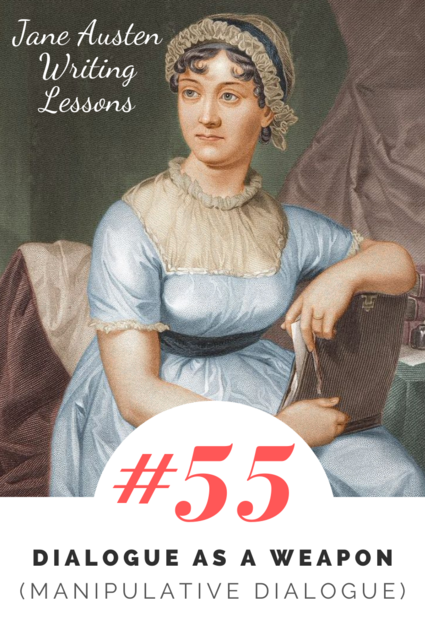

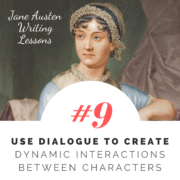
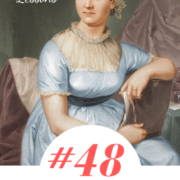
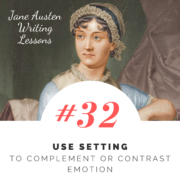
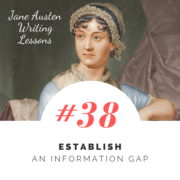
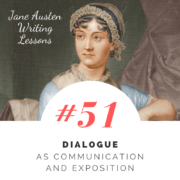


Leave a Reply
Want to join the discussion?Feel free to contribute!